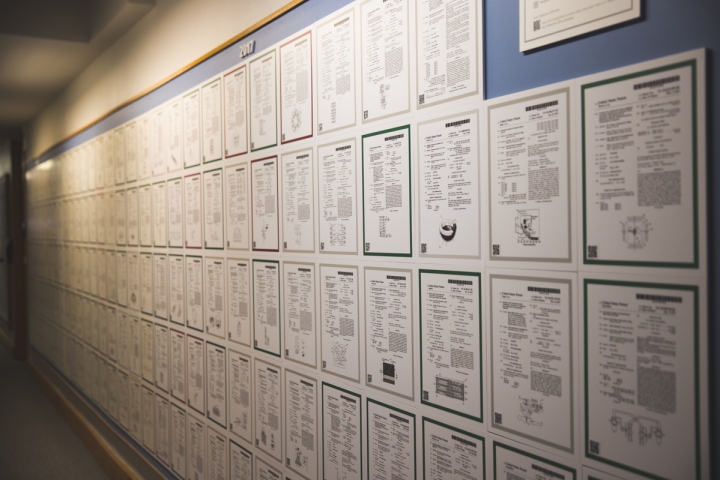Dartmouth last year showed its power as an engine of innovation, ranking 51 among the top 100 universities in the country that were granted U.S. patents in 2023, according to a report from the National Academy of Inventors.
Dartmouth inventions resulted in 43 issued patents (PDF) last year—21 from Thayer School of Engineering, 17 from the Geisel School of Medicine, and 13 from Arts and Sciences. Many of Dartmouth’s patents included inventors from more than one school, including the Guarini School of Graduate and Advanced Studies, highlighting the interdisciplinary approach to research that Dartmouth fosters.
Nine of the patents included inventors from Dartmouth Hitchcock, now known as Dartmouth Health, underscoring the benefits of Dartmouth’s substantial inter-institutional research and clinical collaborations.
“Fundamentally, the reason that Dartmouth is pursuing patents and intellectual property is to magnify the impact of our research in the world,” says Dean Madden, vice provost for research and a professor of biochemistry and cell biology
Madden notes that the NAI list is not adjusted for size, so Dartmouth’s patent-per-faculty ratio compares very favorably to much larger universities that recorded more patents.
“We’re punching way above our weight,” Madden says.
In another measure of Dartmouth’s contributions, Madden points to the 2022 Nature Index normalized “patent influence metric,” which examined how often institutions like Dartmouth have their research cited in patent applications. Dartmouth ranked second in the Ivy League and 23rd in the world.
“Dartmouth faculty, students, and postdocs use novel strategies to tackle fundamental scientific questions. That’s a good recipe for high-impact research, and I think it’s the reason our discoveries are showing up so frequently in patents worldwide,” Madden says.
Dartmouth has made the NAI top 100 list in eight of the past 10 years, according to Kim Rosenfield, director of the Technology Transfer Office at Dartmouth.

One of the new patents, for “resonant coils with integrated capacitance,” was based on inventions developed in the lab of Thayer professor Charles Sullivan along with then-postdoctoral researchers Phyo Aung Kyaw, Thayer ’19, and Aaron Stein, and has been licensed to Resonant Link, a startup working on powering devices wirelessly. The trio co-founded the company along with Grayson Zulauf ’12, Thayer ’13, who is Resonant’s CEO.
Another new patent issued in 2023, for a rapid molecular sensor, formed the basis of a spin-out company, Nanopath, which is developing point-of-care diagnostics for women’s health. Dartmouth Engineering professor John X.J. Zhang co-invented the technology and co-founded Nanopath with Amogha Tadimety, Thayer ’20. Alison Burklund, Thayer ’21, is also a co-founder of Nanopath.
One of the Dartmouth patents in 2022 was credited to Madden, and it has to do with cystic fibrosis and nanobodies. Developed in conjunction with the University of California at Davis, these nanobodies are stable, minimalist antibodies that are easy for researchers to work with. The idea is to use the nanobodies as drugs themselves, as screening tools to find new drugs, or to help customize drug delivery, all in the fight against cystic fibrosis.
Madden estimates that it’s still a couple of years before someone might be able to put his patent to a practical, positive use.
That’s where the Technology Transfer Office comes in. Rosenfield and her team help assess which patents have the potential to be developed into products or services that can be commercialized, what companies might be a good match, as well as negotiating and monitoring licensing agreements.
“We have an experienced team with scientific, business, and legal backgrounds who work with investigators to find the best strategies to get their innovations from the lab to the marketplace. Patenting and commercializing the results of Dartmouth’s research leads to greater impact and makes the world better, improving the environment, and saving lives,” Rosenfield says.
For example, technology developed more than five years ago by then-Geisel professor Jason McLellan and a team of researchers was key to the development of COVID-19 vaccines. The inventions that resulted from research in McLellan’s lab were patented and licensed to vaccine companies. Dartmouth will use proceeds from these licenses to make major investments into advancing its research and education enterprise.
While the licensing agreements can give Dartmouth a financial return on its patents, that isn’t the main goal.
“Our primary mission is to get technology out of the lab and into the world where it can benefit society. The second priority is to attract and retain top faculty. Dartmouth has generous policies designed to encourage translation of research and reward researchers for successful innovation,” says Eric Fossum, vice provost for entrepreneurship and tech transfer and a professor of engineering. “We license many of our patents to companies founded by the inventors.“
Rosenfield also says Dartmouth invests in patents ”with the understanding that much of our cutting-edge research is very early-stage, and may need to be nurtured in a start-up before it is commercially viable."
Several start-up companies based on Dartmouth patents have been acquired by multinational companies, including Medarex, acquired by Bristol-Myers Squibb in 2009 for $2.4 billion, and Reata Pharmaceuticals, acquired in 2023 by Biogen for $7.3 billion.
